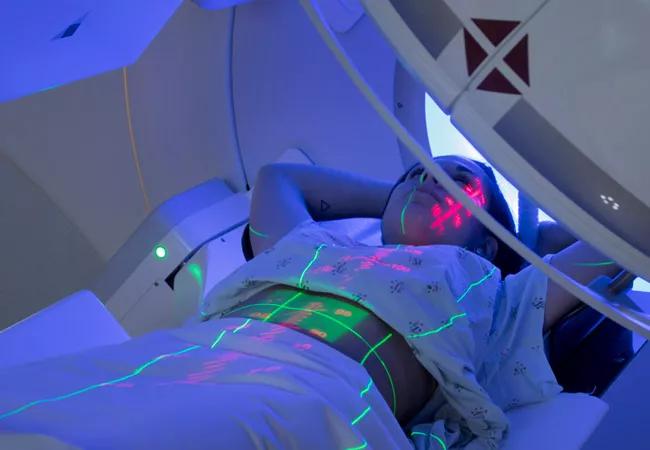Study results presented at DDW 2017

Image content: This image is available to view online.
View image online (https://assets.clevelandclinic.org/transform/df171e09-72ad-4a23-a648-a41937b0fea7/17-DDI-367-Liska-CQD_jpg)
17-DDI-367-Liska-CQD
It turns out that cancer-associated fibroblasts could be the culprit. These cells respond in a surprisingly negative way to radiation delivered as part of neoadjuvant therapy for advanced rectal cancer, a new study reveals.
Advertisement
Cleveland Clinic is a non-profit academic medical center. Advertising on our site helps support our mission. We do not endorse non-Cleveland Clinic products or services. Policy
“Interestingly, cancer-associated fibroblasts actually get activated by radiation to secrete factors that can then, in turn, stimulate the cancer cells and lead to tumor progression and metastasis,” says Cleveland Clinic colorectal surgeon David Liska, MD.
“The exciting clinical implication of this is, that once we further identify these cancer-associated fibroblast [CAF] factors we could then use them (a) as molecular targets to improve the response to radiation and (b) as biomarkers to help predict which patients are more likely to respond to radiation,” Dr. Liska says.
In collaboration with Matthew Kalady, MD and Emina Huang, MD, Dr. Liska isolated primary CAFs from people with rectal cancer who had not received neoadjuvant chemoradiation. They exposed the fibroblasts to 10 Gy of ionizing radiation in vitro, cultured and harvested the cells. Next, they injected mice with either irradiated or non-irradiated CAFs along with rectal cancer cells to compare the effect of radiation on tumor growth.
Compared to non-irradiated CAFs and controls, the irradiated fibroblasts released a number of factors that boosted in vivo tumor growth, according to the study presented at Digestive Disease Week 2017 in Chicago.
Specific factors released include IL8, IL6, bFGF and GRO. These factors may be ideal targets for researchers looking to disrupt the pro-tumor microenvironment during neoadjuvant treatment. “We are currently working on narrowing down which CAF secreted factors are the main contributors to tumor progression so that we can, in pre-clinical models, target these pathways and determine if we can shut down any CAF-related tumor progression after radiation,” Dr. Liska says.
Advertisement
The in vitro phase of the study confirmed the role of the CAFs, with positive staining for the activated fibroblast markers vimentin, alpha-SMA and PDGFR. The investigators also demonstrated that the factors released into the microenvironment by CAFs following radiation significantly increased the migration and invasion of rectal cancer cells in vitro.
Once the investigators identify the major offenders among the CAFs, they plan to analyze the blood and tumor specimens from people with rectal cancer that have been treated with radiation to see which of these factors is associated with clinical radioresistance. The findings could help identify biomarkers useful for predicting an individual’s likely response to neoadjuvant treatment in advance.
About 1 in 4 people with locally advanced rectal cancer who undergo neoadjuvant chemoradiotherapy and surgical resection are found to have no residual tumor cells in the surgical specimen. These patients tend to fare well with a very low risk for recurrence of cancer, Dr. Liska says. The current study holds promise to help identify these complete responders before surgery and also the potential to predict who may not benefit from neoadjuvant treatment. Being able to identify those most likely to benefit from neoadjuvant therapy and surgery could help make clinical decision-making more precise.
“Since we don’t understand the causes underlying the differences in the treatment response between patients, we currently have no way of predicting which patients will respond to chemoradiation to help select patients for this treatment course. Furthermore, there is currently no reliable method to accurately determine after neoadjuvant therapy which patients have sustained a complete pathological response other than surgically resecting the rectum,” Dr. Liska says. “This means that we may be performing major, life-altering, surgery on a significant proportion of patients who could potentially be spared having any surgery.”
Advertisement
Full details of the study were presented during Digestive Disease Week in Chicago, which runs May 6 – 9 at the McCormick Center in Chicago.
Advertisement
Advertisement
Combination therapy improves outcomes, but lobular patients still do worse overall than ductal counterparts
Bringing empathy and evidence-based practice to addiction medicine
Supplemental screening for dense breasts
Combining advanced imaging with targeted therapy in prostate cancer and neuroendocrine tumors
Early results show strong clinical benefit rates
The shifting role of cell therapy and steroids in the relapsed/refractory setting
Radiation therapy helped shrink hand nodules and improve functionality
Standard of care is linked to better outcomes, but disease recurrence and other risk factors often drive alternative approaches